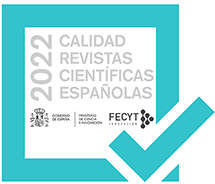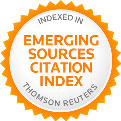Valores posmodernos y motivación hacia el ocio y el ejercicio físico en usuarios de centros deportivos. (Postmodern values and motivation towards leisure and exercise in sports centre users).
Resumen
El artículo presenta un estudio exploratorio sobre la tendencia postmaterialista y la práctica deportiva de usuarios en centros deportivos. El trabajo utiliza la estructura teórica propuesta por Inglehart sobre el cambio cultural postmaterialista y la teoría de la autodeterminación propuesta por Deci y Ryan. El objetivo de la investigación fue explorar las posibles diferencias entre usuarios materialistas y postmaterialistas en su motivación hacia el ocio y la práctica física. 531 usuarios de centros deportivos, con edades comprendidas entre 16 y 60 años, respondieron a diferentes cuestionarios que evaluaban sus valores materialistas-postmaterialistas y los tipos de motivación hacia las actividades de ocio y práctica física. El análisis de correlación entre las variables informó que el indice de postmaterialismo estuvo negativamente relacionado con la motivación extrínseca no autodeterminada respecto a la variable de ocio, y con una regulación introyectada y desmotivación en el caso de la práctica física. A partir de un análisis de medias con muestras independientes (materialistas y postmaterialistas), los resultados revelaron que los usuarios que puntuaron con valores más materialistas reflejaron una motivación menos autodeterminada hacia las actividades de ocio y la práctica física respecto a los usuarios que informaron valores más postmaterialistas. Los resultados son discutidos a partir de las conexiones existentes entre las estructuras sociales y las acciones y decisiones que las personas toman en sus ámbitos específicos de la vida. En concreto, el artículo discute las posibles conexiones entre los valores sociales que la persona posee y la forma en que orienta su ocio, en general, y su ejercicio físico, como un ámbito específico de su vida.
Palabras Clave: postmaterialismo; motivación; autodeterminación; actividad física; centros deportivos.
Abstract
This paper presents an exploratory study on the postmaterialist tendency and practice of sports centre users. The paper is based on the Inglehart framework about postmaterialist cultural change and the self-determination theory proposed by Deci and Ryan. The aim of this study was to explore the possible differences between materialist and postmaterialist centre users on their motivation toward leisure and exercise. 531 sports centre users aged between 16 and 60 answered different questionnaires measuring their materialist-postmaterialist values and types of motivation towards leisure activities and exercise. Correlational analysis between variables showed that the postmaterialist index was negatively related to the non self-determined extrinsic motivation regarding the leisure variable, and to the introjected regulation and amotivation regarding exercise. The findings of the t student analysis (materialist and postmaterialist) indicated that the users who had the highest score in the materialist values showed lower self-determined motivation towards the leisure activities and exercise than the users who reported the highest posmaterialist values. The results are discussed from the existing connections between social structures and the decisions and actions that people can make in their specific scope in life. Specifically, the paper discusses the possible connections between the social values that a person holds and the form their leisure activity takes, in general, and their exercise, as a specific field in their life.
Key words: postmaterialist; motivation; self-determination; physical activity; sport centres.
doi:10.5232/ricyde2011.02506
------------------------------------------------------------------------
Referencias/references
Abramson P. R., & Inglehart R. (1992). Generational replacement and value change in eight West European societies. British Journal of Political Science, 22(2), 183-228.doi:10.1017/S0007123400006335
Aguila, C.; Sicilia, A.; Rojas, A. J.; Delgado, M. A., y Gard, M. (2008). Postmodern Values and Leisure in Young Spanish University Students: An Exploratory Study. Leisure Sciences, 30, 275-292.
doi:10.1080/01490400802165032
Deci, E. L. & Ryan, R. M. (2000) The “what” and “why” of goal pursuits: Human needs and the self-determination of behaviour. Psychological Inquiry, 11, 227-268.
doi:10.1207/S15327965PLI1104_01
Fernández, J. S., & Rojas, A. J. (2003). Analysis of the Unconventional Political Action Scale: Results in Spain. Field Methods, 15(2), 131-142.
doi:10.1177/1525822X03015002002
González-Cutre, D.; Sicilia, A., y Fernández, A. (2010). Hacia una mayor comprensión de la motivación en el ejercicio físico: Medición de la regulación integrada en el contexto español. Psicothema, 22, 841-847.
PMid:21044522
Guay, F.; Mageau, G. A., & Vallerand, R. J. (2003). On the hierarchical structure of self-determined motivation: A test of top-down, bottom-up, reciprocal, and horizontal effects. Personality and Social Psychology Bulletin, 29, 992-1004.
doi:10.1177/0146167203253297
PMid:15189618
Inglehart, R. (2008). Changing Values among Western Publics from 1970 to 2006. West European Politics, 31(1-2), 130-146.
doi:10.1080/01402380701834747
Inglehart, R., & Abramson, P. R. (1994). Economic security and value change. American Political Science Review, 88(2), 336–354.
doi:10.2307/2944708
Lewis, S. (2003). The integration of paid work and the rest of life. Is post-industrial work the new leisure? Leisure Studies, 22, 343–355.
doi:10.1080/02614360310001594131
McFee, G. (2004). Sport, rules and values. Philosophical investigations into the nature of sport. London: Routledge.
doi:10.4324/9780203299876
Pelletier, L. G.; Fortier, M. S.; Vallerand, R.J., & Brière, N. M. (2001). Associations among perceived autonomy support, forms of self-regulation, and persistence: A prospective study. Motivation and Emotion, 25, 279-306.
doi:10.1023/A:1014805132406
Roberts, K. (1997). Same activities, different meanings: British youth cultures in the 1990s. Leisure Studies, 16, 1–15.
doi:10.1080/026143697375476
Rojek, C. (1993a). After popular culture: hyperreality and leisure. Leisure Studies, 12, 277–289.
doi:10.1080/02614369300390261
Sarrazin, P.; Vallerand, R.; Guillet, E.; Pelletier, L., & Cury, F. (2002). Motivation and drop out in female handballers: A 21-month prospective study. European Journal of Social Psychology, 32, 395–418.
doi:10.1002/ejsp.98
Standage, M.; Duba, J.L., & Ntoumanis, N. (2003). Predicting motivation regulations in physical education: The interplay between dispositional goal orientations, motivational climate and perceived competence. Journal of Sports Sciences, 21, 631-647.
doi:10.1080/0264041031000101962
Stebbins, R. A. (2000). The extraprofessional life: Leisure, retirement and unemployment. Current Sociology, 48(1), 1–18.
doi:10.1177/0011392100048001002
Vallerand, R. J. (1997). Toward a hierarchical model of intrinsic and extrinsic motivation. Advances in Experimental Social Psychology, 29, 271-360.
doi:10.1016/S0065-2601(08)60019-2
Vallerand, R. J.; O’Connor, B. P., & Hamel, M. (1995). Motivation in later life: Theory and assessment. International Journal of Aging and Human Development, 41, 221-238.
doi:10.2190/YLFM-DGUE-HRL2-VWLG
Williams, G. C.; Grow, V. M.; Freedman, Z. R.; Ryan, R. M., & Deci, E. L. (1996). Motivational predictors of weight loss and weight-loss maintenance. Journal of Personality and Social Psychology, 70, 115–26.
doi:10.1037/0022-3514.70.1.115
PMid:8558405
Wilson, P. M., & Rodgers, W. M. (2004). The relationship between perceived autonomy support, exercise regulations and behavioral intentions in women. Psychology of Sport and Exercise, 5, 229-242.
doi:10.1016/S1469-0292(03)00003-7
Wilson, P. M.; Rodgers, W. M.; Loitz, C. C., & Scime, G. (2006). “It’s who I am … really!” The importance of integrated regulation in exercise contexts. Journal of Applied Biobehavioral Research, 11, 79-104
doi:10.1111/j.1751-9861.2006.tb00021.x
Palabras clave/key words
Texto completo/Full Text:
PDF------------------------ 0 -------------------------
RICYDE. Revista Internacional de Ciencias del Deporte
![]()

Publisher: Ramón Cantó Alcaraz
ISSN:1885-3137 - Periodicidad Trimestral / Quarterly

